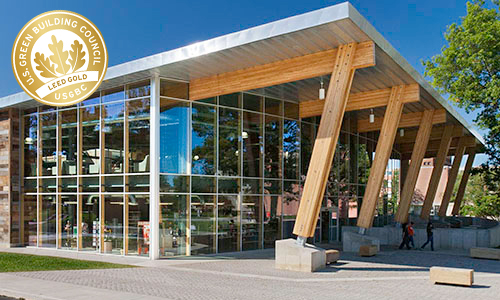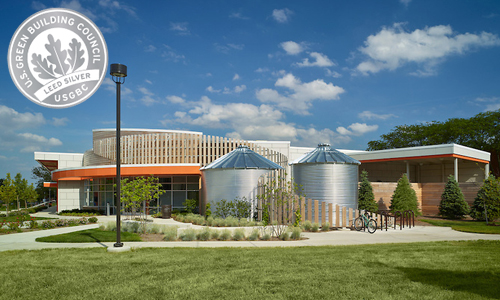Sustainable Dining
Campus Sustainability partners and collaborates with BGSU Dining on a wide variety of projects and initiatives in order to further the university's sustainability goals. Just some of the results of those collaborative efforts include zero-waste picnics, reusable bags, composting, increased vegan food options, and much more.
As explained more fully on the BGSU Dining website:
"BGSU Dining’s approach to social responsibility and sustainability is tied into our overall Balanced U wellness programming. Through a variety of innovative programs and policies, we work closely with the communities we serve to reduce the impact our operations have on the world around us. Our focus on recycling, resource conservation, and waste reduction not only helps us operate more efficiently, but it also lets us ensure that the resources we use today will be available for future generations."
BGSU Dining's Balanced Sustainability Approach
Our industry is facing rapid demand for services that have a meaningful sense of environmental and social responsibility. We believe that the health of our eco-system is directly connected to the health of our communities and people who live in them.
Study after study consistently reinforce that the American consumer is engaging "sustainability" values into their daily lifestyle. The origin of food, how and where it is produced are at the top of our minds when creating dishes for our customers.
Acting responsibly is part of our DNA and we are committed to offering foods that are earth, body and community friendly.
In support of that position, we are committed to the following:
- Buying local products to support family farms
- Serving seafood that comes from sustainable sources
- Promoting certified humane cage-free eggs
- Purchasing poultry produced without the routine use of human antibiotics
- Providing milk that is free of artificial growth hormones
- Implementing waste reduction practices to minimize environmental impact
- Offering packaging made from renewable resources
- Featuring social and ecological certified coffee
- Customer nutrition, health & wellness
The Oaks Dining Center
Features
- Solar Panels:
- Green roof with herb garden
- Kiosk explaining green designs
- Employee shower facilities
- Bike racks, etc. to promote commuter alternatives
Design
- Glass exposures for natural light
- Thermal comfort design
Construction
- Site preparation used demolished building recycled materials for fill
- Construction waste recycled at 75%
- Materials used are low emitting - sealants, adhesives, paints and floorings
- All materials used were purchased within a 500 mile radius.
Materials
- Materials used are 20% recycled
- Flooring materials are recycled products
- Bamboo flooring - renewable resource
- Ohio barn wood utilized in flooring, millwork, and wall treatments
Systems
- Solar power assist to electric needs
- Enhanced refrigeration equipment
- Alternative transportation for fuel-efficient delivery vehicle
- Storm water reclamation system
Water Conservation
- Water reduction of 35%
- Storm water reclamation for gray water use in restroom fixtures
- Storm water reclamation for all landscape irrigation
- Pulper for garbage processing
- Trayless Dining to save on waste
The Carillon Place Dining Center
Design
- LEED Certified Silver
- Glass exposures for natural light
- Thermal comfort design
Construction
- Site preparation used demolished building recycled materials for fill
- Construction waste recycled at 50%
- Materials used are low emitting - sealants, adhesives, paints and floorings
- 20% of materials are obtained locally
Materials
- Materials used are 20% recycled
- Flooring materials are recycled products
- Bamboo flooring - renewable resource
Systems
- Energy use optimized by 14%
- Alternative transportation for fuel efficient delivery vehicle
Water Conservation
- Water reduction of 30%
- Storm water reclamation for all landscape irrigation
- Pulper for garbage processing
- Trayless dining to save on waste
Trim Trax is a food waste reduction program that is used by BGSU Dining to track, measure and reduce the amount of kitchen food waste in our facilities. It is designed to increase operational efficiencies and create awareness about reducing food waste and its environmental impact. This program has been extremely successful to date in reducing waste year over year.
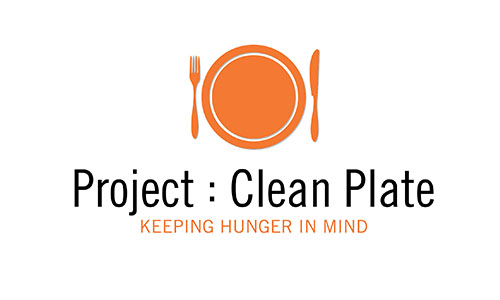
Project Clean Plate is a program used in conjunction with trayless dining which helps reduce food waste in our resident dining halls and creates awareness among students. Once a semester, an educational program is run in the Oaks and Carillon Place dining facilities. Food waste is monitored at the disposal area the week prior to the event to create a benchmark. The week of Project Clean Plate, volunteers that consist of students, faculty and staff work to educate students on the importance of waste reduction and encourage patrons to turn in clean plates at the bussing station. Each student that turns in a clean plate is entered to win free Falcon Dollars to further incentivize waste reduction. An estimate of wasted food is recorded and posted in the servery showing students day-by-day results. The posted results educate students about how much wasted food is thrown out on a daily basis, which could be prevented. BGSU Dining commits to a donation to the Wood County United Way Program in the name of the students of BGSU based on the amount of waste that can be reduced during the week of Project Clean Plate. To date, BGSU Dining by Chartwells has donated $4,700 in the name of the students. The week following the event, measurements are continued to see the lasting affect of the educational program.
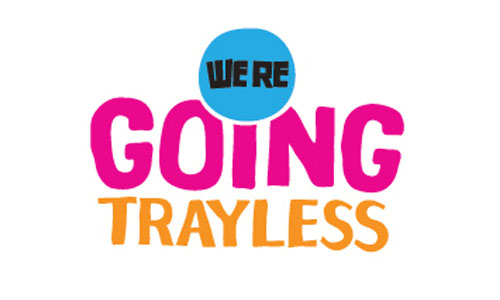
Trayless dining has swept across college campuses throughout America and is gaining international attention. Trayless dining curtails food waste, promotes healthier eating habits through portion control, and reduces the amount of water and energy consumption used for washing the trays. Going trayless in dining facilities is one way to combat food waste and educate students about its environmental impact.
Chartwells’ Carbon FoodPrint™ toolkit is a Web-based program designed to engage our managers and clients to work as partners and build an extensive strategy to minimize the carbon footprint of their foodservice operations. The toolkit focuses on four key areas: menu engineering, kitchen services, site equipment, and facilities management. BGSU Dining has used this toolkit to review current efforts and to find opportunities for future improvements.
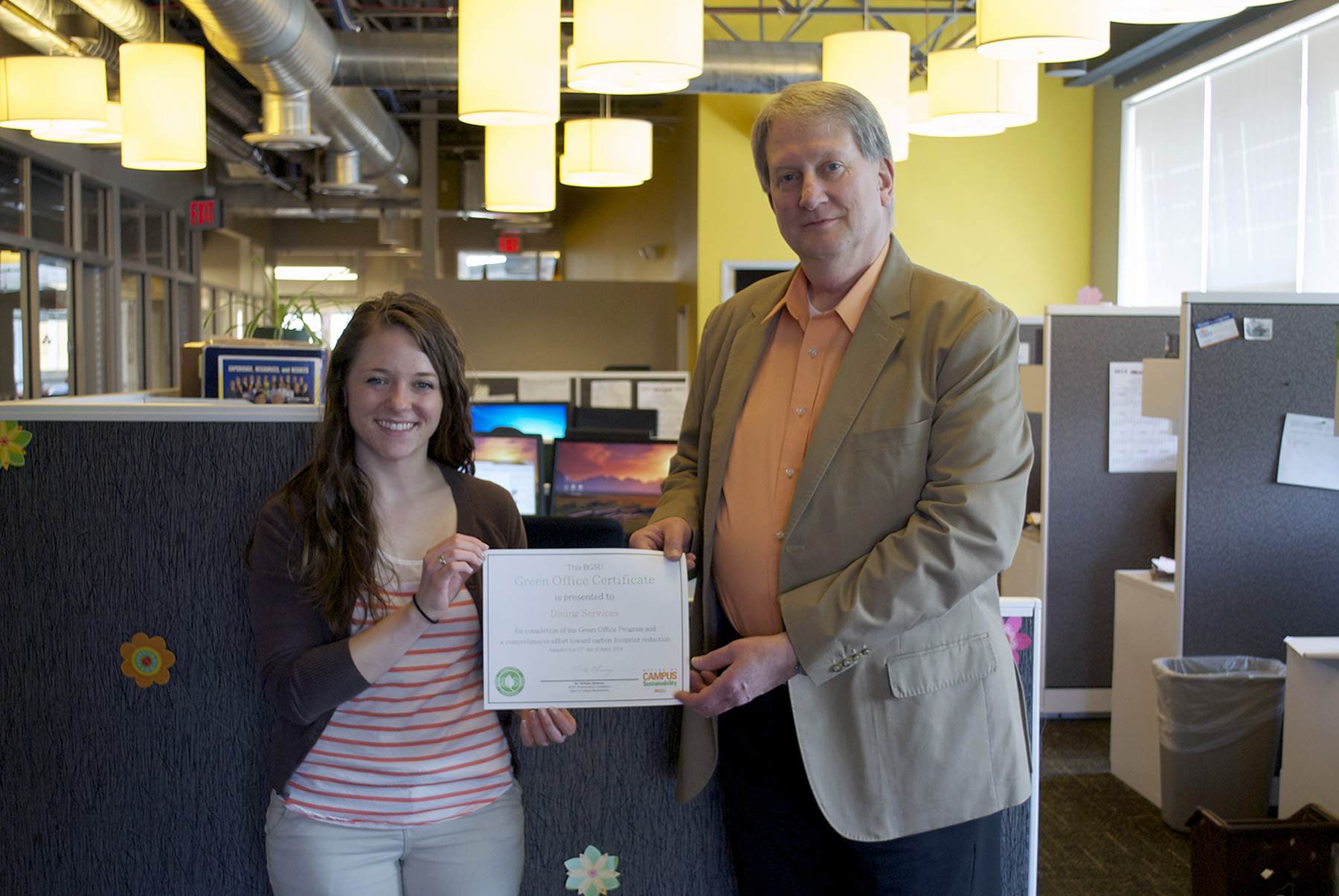
BGSU Dining was the 3rd office on campus to earn the Green Office Certification. Dining was able to earn 81% of the possible points required for the certification. Most of Dining’s points came from recycling, purchasing, meetings and the break room. BGSU Dining will continue to work to improve our sustainability and will look for new ways to minimize our impact on the environment.
Composting
BGSU Dining has partnered with Campus Sustainability to expand pre-consumer composting to all four main BGSU Dining locations.

BGSU Dining currently composts pre-consumer produce (waste not served to customers, i.e. rinds, peels, skins, etc.) from the Oaks Dining Center, Carillon Place, the Sundial at Kreischer, and the Falcon's Nest in the Student Union. Pickups are made by Stevens Disposal & Recycling Service, Inc. twice per week. They transport the pre-consumer food waste to Hirzel Farms, an EPA Class II certified composting facility in Pemberville, Ohio. This process diverts an average of 970 pounds of waste from the landfill each week. This initiative is funded by the Student Green Initiatives Fund.
What is composting? Composting is essentially "recycling" for food waste. It keeps organic waste out of the landfill by allowing it to decompose into a fertile soil-additive known as "compost", which can be directly used to fertilize plants.
Why is it helpful? Composting reduces the amount of solid waste sent to the landfill while simultaneously reducing BGSU’s "carbon footprint.
For more information, contact us at greenbg@bgsu.edu.
Recycling
BGSU Dining’s goal is to minimize our impact on the environment with our primary focus on REDUCTION.
Our approach is to bring awareness and education and implement best practices were viable for waste management, water conservation, energy efficiency, and pollution control. BGSU Dining is part of the Energy Management Program on campus to reduce electrical consumption.
- One of the largest recyclers on campus
- Reduce paper waste by using LCDs as a form of advertisement
- Recycle working equipment by selling/lending to other entities to use, or in our own facilities
- Caught Green Handed program at Kreischer to encourage recycling
- Amnesty program to reduce china and silverware waste
- Offer reusable grocery bags to cut back on plastic waste
- Offer reusable bottles and coffee mugs to encourage patrons to forgo paper cups as well as a discount program to encourage use
- Use post consumer products - Napkins, paper towels, toilet paper and office paper
Did You Know?
Starbucks offers a discount of $0.10 for using a reusable mug.
Updated: 09/19/2025 09:27AM





